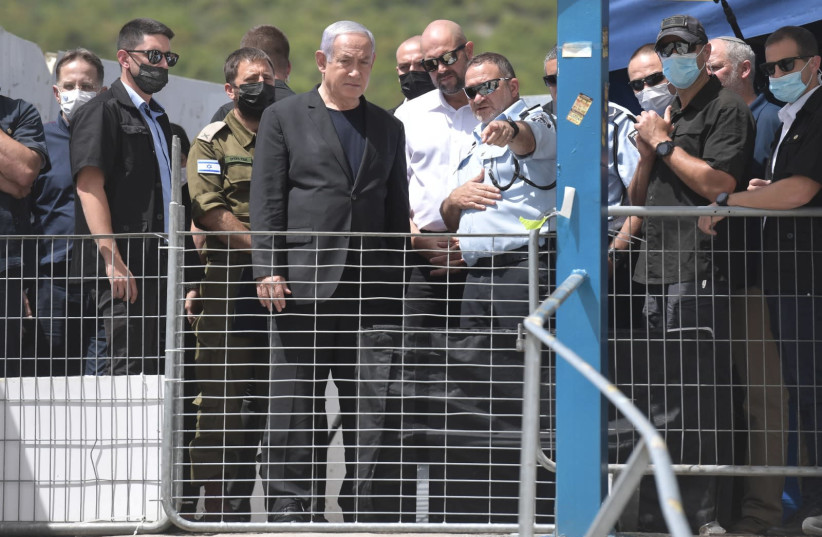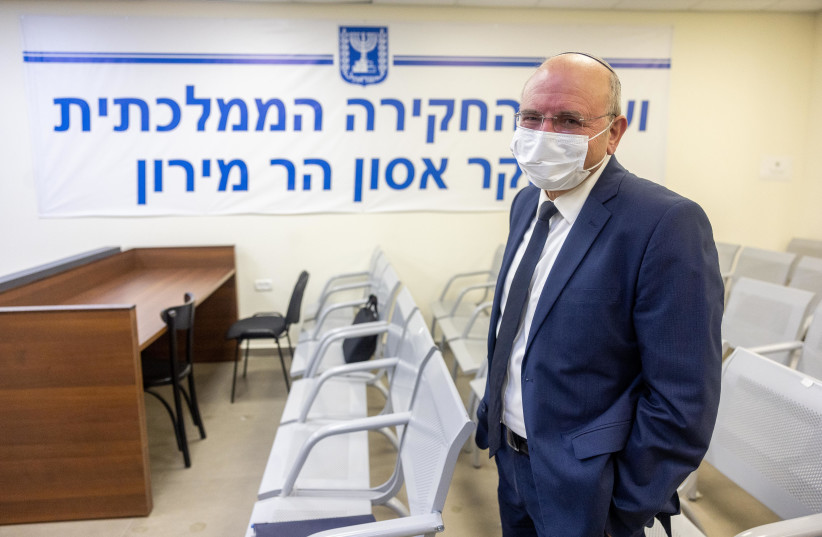The Mount Meron disaster state Commission of Inquiry on Tuesday issued its first official letters warning of negligence and legal wrongdoing. It placed the blame on former prime minister Benjamin Netanyahu, former public security minister Amir Ohana, Israel Police Insp.-Gen. Kobi Shabtai, former religious services minister Ya’akov Avitan and several other police, government and safety officials.
The Mount Meron disaster occurred on Lag Ba’omer in 2021, when 45 people were trampled to death. Much of the yearlong inquiry has revolved around failures by engineers, religious services and police officials involved to ensure that the structures around Meron were safe and the site was not overwhelmed.
The inquiry has also questioned top political officials, all of whom had worried that the inquiry would place the blame on them during election season.
Notably, former interior minister Arye Deri was not given a warning.
Commission warnings come after intense round of testimonies
The warnings came a month after Netanyahu and former National Security Council adviser Meir Ben-Shabbat testified to the committee, wrapping up a round of top officials, which included Deri and Ohana.
“I cannot take responsibility for something I did not know,” Netanyahu told the state-appointed Commission of Inquiry in late July, adding that his responsibility pertained to the epidemiological consequences of holding the festival during the height of a COVID-19 outbreak.

In his testimony, Netanyahu said he “knew hundreds of thousands – 400,000 or 300,000 – I do not remember exactly, people came to Meron. I knew there was ongoing supervision, as determined by a government decision.” He added that he “did not know there was a critical safety issue. I heard about overcrowding but do not think we knew there was a safety issue.”
Netanyahu deflected questions about how he could be prime minister for 12 years and not be held responsible, saying he had still tried to improve on the relevant issues more than previous prime ministers.
Netanyahu rejected allegations that he was pressured to ignore safety issues by his haredi political partners, adding that he had shut down Meron during spring 2020 due to the coronavirus crisis.
On Tuesday, the Commission of Inquiry said these answers might not suffice due to how long Netanyahu served as the country’s premier and the number of comptroller and other government reports that had warned his office of disaster.
The Likud said in response, “We participate in the families’ [of the victims] great pain.”
“Since the country was established, no State Commission of Inquiry sent warning letters to political candidates during the election period,” it said. “It is saddening that the committee of investigation, which was established on the Bennett-Lapid government’s initiative, chose to do so.”
Neither Netanyahu nor Ohana released responses specific to their involvement in the issue.
Despite the Likud’s attack on the timing, the commission does not control when politicians cause early elections, and its findings might have come out three months ago had its original chairwoman, Miriam Naor, not died mid-inquiry. It could say there is no guarantee that delaying until November 1 would have avoided political criticisms, and it was logical to publicize its report about a month after Netanyahu, the last witness, testified.
A number of police officials and other officials involved with the site have said they were heavily pressured by the political echelon, including Deri and Ohana, to ignore any related safety issues to facilitate the maximum number of attendees.
Politicians were under pressure to maximize the number of attendees in 2021 because the coronavirus had led to the complete cancellation of the event in 2020.
Deri and others have said the overall responsibility for safety issues should be on the police or the relevant engineering officials.
Ohana has said he was concerned when he saw the status of the structures on the mountain, but he was told the structures had all of the appropriate approvals from relevant safety officials.
However, the committee said he did not take the danger seriously enough or ask enough questions of those he had responsibility for.
Regarding Shabtai, the inquiry said his planning was too reactionary and not sufficiently preventative, adding that he had depended too much on spotting and coping with issues on the fly.
Lawyers Eliram Bekel and Oded Gazit, representing Shabtai, responded that his being warned did not mean the inquiry would make a final negative finding against him. Rather, they said they were confident the inquiry would ultimately place the blame on a variety of other government agencies that were also warned. Shabtai had not been police chief for long when the Lag Ba’omer disaster occurred, and he could not be held accountable for prior police failures, they said.
Shabtai also made a statement later on Tuesday, saying he had no intention of resigning and that it was crucial that the police have continuity of leadership and command in the midst of a variety of ongoing challenges to the country.
On April 11, Shabtai attempted to shift responsibility for the tragedy onto the head of the police’s Northern District, Asst.-Ch. Shimon Lavi, as well as former police operations commander Amnon Alkalay, who is a fierce critic of Shabtai.
Alkalay said despite senior police officers’ recommendations to restrict the crowd at each bonfire, Shabtai had outright rejected it.
“[Shabtai] said: ‘Either the mountain is completely open or closed,’” Alkalay said. “I warned them to prepare for a multi-casualty incident.”
During the preparatory meeting for the incident, “the chief said: ‘If there is a Commission of Inquiry, you can put it on me,’” he added.
Shabtai rejected Alkalay’s testimony.
Lavi and several other police officials were also warned by the inquiry.
Ben-Shabbat was not warned by the inquiry after he told them his staff’s role in the oversight was “minimal” and that “specific professional experts” needed to be in charge, though they gave him a hard time when he testified in mid-July.
The commission’s head, retired judge Devorah Berliner, and commission member Maj.-Gen. (ret.) Shlomo Yanai said Ben-Shabbat could have prevented the disaster.

Berliner and Yanai challenged him, noting transcripts and testimonies that he and NSC representatives had been present at planning meetings and supervised aspects of the interactions between the different government players involved. In the end, however, they accepted his claim that NSC involvement was limited to making sure agencies such as the Health Ministry and the police were communicating properly.
Rabbi Shmuel Rabinovitch, who is in charge of the Western Wall and other holy sites, was also sent a warning letter. However, he placed blame on an extremist hassidic sect, which he said insisted on keeping a presence at Meron using unsafe structures and without supervision, arguing that they ignored his input.
Observers have credited the committee’s interim recommendations with facilitating a safer Lag Ba’omer this past May.
Eliav Breuer contributed to this report.
